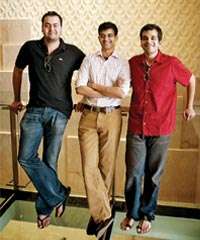Mangal Dalal makes an interesting point as we settle in for an interview over coffee. “The idea of Restaurant Week is to give people an experience they aren’t likely to subscribe to on their own.”
Co-founders Mangal and Nachiket Shetye are gearing up to kickstart the September ’12 edition of Restaurant Week India. To be held simultaneously in Delhi, Mumbai and Bangalore— the two have been quite busy, making sure everything is as seamless as possible.
“We’ve made quite a few changes since the last edition, the price point being one thing. Bangalore is an extremely price-sensitive market. So this year, we’ve got meals at `750 plus taxes for three courses and it’s worked. The idea is to give everyone the opportunity to try out a restaurant they would not normally walk into — either because it’s too formal, expensive or the diner did not put on his experimental cap,” Mangal adds.
Keeping it under `1,000 enabled the organisers to reach out to a wider audience. “The price is a good balance; it’s low enough for customers to try out a new place and just right for restaurants to break even. They won’t make any money but they won’t lose any either,” he says.
Seventeen restaurants across cuisines, ambience, service and geographies — the count of participating restaurants in Bangalore has definitely impressed the two. “We came into the city and over a week, we ate at over 25 restaurants and zeroed in on the top 17.
The entire experience is curated and therefore, we know what is going to be served. The focus is definitely on the menu,” Nachiket proffers.
Discussing on the kind of experience one can expect, Nachiket says, “We’ve focussed on the dishes the restaurants do best. There is no point in them seducing a diner with something drastic and then not have him return to the place. And if there are no repeat customers, why would that restaurant partner with us the next time?”
The two like to call Restaurant Week, ‘a flea market of sorts’. “People bring in their stuff, we add our inputs, come to a conclusion and then the selling begins. And everything is at a good price,” Mangal points out.
Talking about the three different yet parallel events, it’s hard not to compare the three cities. And both made some very interesting points. “Mumbai has a large vegetarian population. And I am referring to the general public, not the affluent. Even among non-vegetarians, they have days on which they don’t eat meat. Chicken and fish are the two preferred meats.
Delhi, on the other hand, is very trend driven. The general spread of mid-level restaurants is way better than most other cities but the dining out pattern is based more on ‘what is doing well’ than on knowledge and information. Of course, how much they spend is also a factor.
Bangalore, we have found, has more information when it comes to eating out. Most food lovers know what’s going on in their city and where to get their favourite food. They are also more open to go beyond their regular places, and that’s commendable,” they say.
Back to the event that’s coming up soon, Nachiket says, “As for the restaurants in Bangalore, we need people to be on board with us. Feedback is a must and we expect that from our customers. If a restaurant makes a technical fault and that’s pointed out, correction has to be made. We don’t want restaurants who don’t identify with our cause to be a part of this, because this is a very special initiative for us,” sign off the two.
source: http://www.dnaindia.com / Daily News & Analysis / Home> LifeStyle> Report / by Priyadarshini Nandy, Place:Bangalore, Agency:DNA / Saturday, September 15th, 2012
